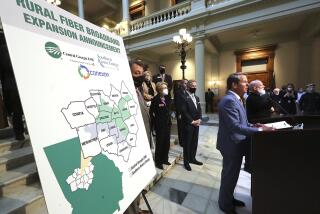Governors Detail Priorities for ‘Peace Dividend’ : Spending: State leaders urge that money saved from defense budgets be used for pressing domestic needs.
- Share via
WASHINGTON — The nation’s governors Sunday called on President Bush to use any “peace dividend” resulting from eased world tensions to cut the federal deficit and boost spending on education and other domestic needs.
But they got little encouragement from Bush’s budget director, Richard G. Darman.
The governors unanimously adopted a resolution at their annual winter meeting here urging Bush and the Congress “to dedicate the peace dividend in a balanced manner among the federal budget deficit, education and other productivity investments.”
At the same session, the governors also gave their unanimous approval to a six-point plan--hammered out over the past six months in collaboration with White House aides--to improve American education over the next decade.
The two actions were directly linked when Democratic Gov. Roy Romer of Colorado amended the “peace dividend” resolution, initially authored by Democrat Mario M. Cuomo of New York, to include the specific reference to education spending.
Referring to the fact that the education proposal included no details on how its ambitious goals would be financed, Romer said: “It is important that we send a message to the country that you don’t get there just by saying we want to go there. You get there by reallocating resources.”
Earlier in the day, at a meeting of the executive committee of the National Governors’ Assn., Romer pressed Darman to make some commitment for increased federal financial support in view of what Romer called the “unique” opportunity for establishing new priorities as a result of the abatement of the Cold War.
Darman, who later told reporters that the peace dividend could total about $150 billion over the next five years, said the White House would be willing to consider a specific proposal from the governors for reallocation of federal revenues. But he also argued that Washington was already spending an increasing share of total revenues on Social Security and health insurance while the portion expended at the Pentagon was shrinking.
“The impression I got is that they (the Bush White House) believe the President had better not change his commitment on defense because of what has been happening in Eastern Europe,” for the time being, Democratic Gov. Bill Clinton of Arkansas said in an interview.
Clinton, who co-chaired the task force that drafted the governors’ education proposals, said he understood the strategy reasons for the decision of Bush and his advisers to await further developments from the Soviet Union before agreeing to arms cutbacks. “But I wish they would be more explicit about what they hope will happen,” he added.
Meanwhile, in another reflection of the impact of the changing world situation, Democratic governors from 11 states with economies dependent on military spending released a plan to minimize the impact of defense cutbacks on their constituents.
Described as “a strategy for beating swords into plowshares,” the plan calls for retraining of displaced workers, assistance for small business, help for communities seeking to diversify their economies and increased federal spending on civilian research and development.
The group was organized by Govs. William Donald Schaefer of Maryland and Richard F. Celeste of Ohio. The other states represented were Massachusetts, Washington, New York, Connecticut, Colorado, Louisiana, Mississippi, Michigan and New Jersey.
Celeste said that Gov. George Deukmejian of California and three other Republican governors--from Florida, Texas and Missouri--had been asked to join the group in sponsoring the plan, which they submitted to congressional leaders for action. But all four declined, according to Celeste.
More to Read
Get the L.A. Times Politics newsletter
Deeply reported insights into legislation, politics and policy from Sacramento, Washington and beyond. In your inbox twice per week.
You may occasionally receive promotional content from the Los Angeles Times.










